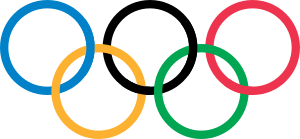Olympics readership depended on language
The past few weeks of the Traffic Report have been dominated by the 2016 Summer Olympics. Since the Olympics are one of the world's biggest international events, you might guess that it dominated the most-viewed articles of other language Wikipedias. And you would be right. But the topics of interest around the world show interesting variations. We love the Olympics, but also love our own Olympics and Olympians.
Using the WMF data available through TopViews*, we compiled charts of the 15 most popular Olympic-related articles for the period of August 5–21, the official period of the Olympics, for seven different language Wikipedias: English, Spanish, German, Portuguese (the language of Brazil, the host country), Russian, French, and Japanese. We considered, but declined, to include the Chinese Wikipedia due to its blockage in China greatly affecting its viewership.**
First of all, Michael Phelps really is popular worldwide. His biography was far and away #1 in English, #2 in Russian and Spanish, #3 in Portuguese, #4 in French, and #5 in German. Similarly, Usain Bolt was generally behind Phelps, and solidly the second most popular athlete of the Games. He ranked #3 in English, #4 in Spanish, #5 in Russian, #6 in Portuguese and French, #8 in Japanese, and #11 in German.
But the old saying "big in Japan" did not apply to Phelps, where he placed 12th, the only place where Bolt was about 25% more popular. To be big in Japan, though, you really had to be Japanese—the top seven Olympic-related articles were filled by Japanese medalists, not even interrupted by general articles like 2016 Summer Olympics (#1 on five lists) or the All-time Olympic Games medal table which were usually popular across the board. Japan's list was led by Saori Yoshida, who won wrestling silver, and had 240% the views of Phelps. She was followed by many others, presumably now household names in Japan, including gymnast Kōhei Uchimura (#2) and table tennis whiz Ai Fukuhara (#3).
Though the Japanese Wikipedia is the most extreme case, it is not fair to single it out; the data reveals that every language edition tends to favor its own. French judo practitioner and gold medalist Teddy Riner beat Phelps and Bolt on the French Wikipedia. Elsewhere, local favorites were not far behind Phelps and Bolt. In Spanish, Argentine tennis player Juan Martín del Potro, who won silver, was #5, and Spaniard Rafael Nadal was #9. In German, horizontal bar gold medalist Fabian Hambüchen (#8) was the top local hero. And in English, American gymnasts including Simone Biles (#4) and Aly Raisman (#9), and swimmers Katie Ledecky (#8) and Ryan Lochte (#11), were prominent, though India's P.V. Sindhu, who won silver in badminton, drew an impressive #6 showing on the otherwise American-dominated list. Sindhu and the top Americans, other than Phelps, do not appear on the other charts. And vice-versa: English speakers, for instance, were not focused on the three medals won by Russian gymnast Aliya Mustafina (#6 in Russia); she doesn't appear anywhere on the English (or other) charts.
Everybody wants to know how everyone else is doing; medal table charts were also popular articles, including the All-time Olympic Games medal table and the 2012 table. But people especially want to know how their country is doing. Thus the Spanish Wikipedia saw Mexico at the Olympics at #10, Colombia at the Olympics at #11, and Argentina at the Olympics at #13. Brazil at the Olympics was #5 on the Portuguese Wikipedia, and in their respective domains, Russia at the 2016 Summer Olympics was #3, and France at the 2016 Summer Olympics was at #10.
Not popular in English, but rather popular elsewhere, was Football at the 2016 Summer Olympics. Perhaps because the American women's team floundered, no football-related articles are in the English Top 15, but such articles hit #3 in Germany (who won medals in both men's and women's), #7 in Spanish, #8 in Portuguese, and #14 in Russian. But if your country is good in a sport, like Germany was in football, or France was in the modern pentathlon (women's silver, #5), that's what you're most likely going to watch.
Our data collection showed that the Olympics were very popular everywhere. Other non-Olympic topics do appear in their general charts (remember the charts below are Olympic-only articles), just as we see on the Traffic Report, but to about the same extent. The lone exception may be Russian, where the popularity of other articles such as the film Suicide Squad seemed a bit higher—perhaps a reflection of the disqualification of many Russian athletes.
So, just like the Ancient Olympic Games brought together all of Greece, the modern Olympics does seem to bring us all together. We may celebrate our own victories a bit more, but that is part of a human nature we all share and treasure.



